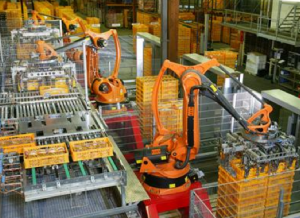 McKinsey Research predicts that in ten years, 140 million knowledge worker jobs could be replaced by office automation, and 75 million jobs by robots. Already we’re seeing it happen. What if it happens to you? Do you have a strategy?
McKinsey Research predicts that in ten years, 140 million knowledge worker jobs could be replaced by office automation, and 75 million jobs by robots. Already we’re seeing it happen. What if it happens to you? Do you have a strategy?
Our friend Robert Tucker over at Innovation Resource shares four ways to ensure your future viability:
Four Ways to Make Yourself Indispensable
Honk if this sounds like you: You’re rushing from meeting to meeting putting out fires. You’re multi-tasking, texting, and counting the days till vacation. Lately you’re noticing a trend: job automation. Airport ticket counters staffed by fewer and fewer agents. Parking garage attendants replaced by self-pay machines. Once hot jobs like data center manager disappearing into The Cloud. Could your job be next?
Call it the Great Restructuring — a megatrend that’s gaining momentum by the day. From accountants to X-ray technicians to lawyers, jobs are vaporizing, replaced by software, algorithms and robots. By 2025, predicts McKinsey Research, 140 million knowledge worker jobs could be replaced by office automation, and 75 million jobs by robots. What can you do, not just to ensure your employment, but your employability in the years ahead?
As a futurist and innovation expert, I approach the automation challenge much the same way that I approach industry disruption. If you are willing to embrace its imperatives, this brave new world of work can become your opportunity. If you’re willing to study up on the issue, and take action daily to adapt, you’ll ride this wave into the future. Here are four ways to ensure your viability going forward:
1. Do an assessment. If your job can be “routinized,” it’s probably going to disappear. Begin by asking yourself some questions: How can this trend be approached with an Opportunity Mindset rather than a Defeatist Mindset? What are other forward-thinkers doing to make this trend their friend? And what will the workplace look like in 10 years and what might you do starting now to prepare?
According to much-cited MIT research, if a job involves learning a set of logical rules or a statistical model that you apply to task after task, day after day, that job is ripe for replacement. What jobs will be left, in high demand even? In my work with “high potential” managers in companies like American Express, Johnson & Johnson, IBM, Cisco and others, I observe the qualities that are much needed, but that most companies are desperate for.
After interviewing 43 standout managers and contributors from a variety of organizations for the book Innovation is Everybody’s Business, I have identified what it takes to be successful in the emerging non-routine world. These contributors don’t just master the functional and technical skills that got them hired in the first place. They go beyond. They develop subtle aptitudes and abilities that enable them to get new things done. I call them Innovation Skills, or I-Skills for short. For example, can you lead a cross-functional team tasked with doing something the organization has never done before? Can you sell your ideas to superiors, to colleagues, to your reports? Can you challenge assumptions that hold back fresh unfettered thinking? Do you see the big picture? Can you empathize with the end user? To assess your I-Skills, I’ve developed a simple survey that will give you a quick idea of where you stand.
2. No matter what lies ahead, your I-Skills will differentiate you.
While constantly looking for ways to reduce headcount, organizations are in need of people who know how to add value no matter where they’re placed. Paulette, a facilities manager in a large Canadian tech company, described her I-Skills this way:
“A lot of people in this profession think what we do is provide space for people to work in. They leave it there. But it’s really much more: it’s looking at the life cycle management of buildings, looking for greater cost savings and green buildings; it’s finding new and better ways of doing things.”
Whether you’re in facilities management, human resources, manufacturing, or brand management, things are changing so fast that you’re confronted daily with situations you’ve never faced before. So it’s how you deal with them that matters.
We encourage you to read the rest of Robert’s article here.
Also, we recently came across a new in-depth guide on industrial automation from the Horner Automation Group that looks at three common aspects of industrial automation – The Ultimate Guide to Industrial Automation
